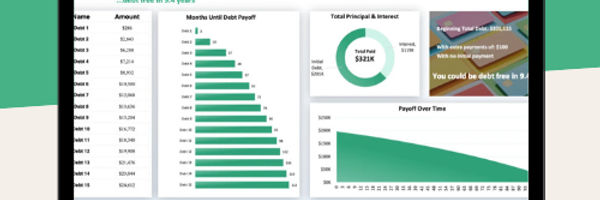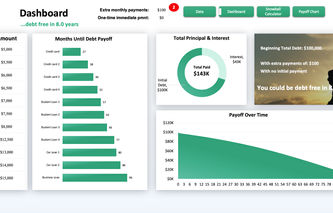Your credit score is a solid 650—but your neighbor just subtly told you that they finally reached 700. Is that how they got their flashy new car? Or is there a big money-making secret you don’t know about?
Well, there are no secrets here.
Let’s uncover where those extra 50 points get you as we reveal what a good credit score really is.
This article will show you:
What is considered good credit.
What a FICO score is, and why it matters.
The best credit score for you.
Which credit score you need to buy a house.
How to get a perfect credit score.
Check out more relevant articles:
What Is a Good Credit Score?
Generally, a credit score of 580 to 669 is fair, a 670 to 739 is good, a 740 to 799 is very good—and anything over 800 is excellent.
But is it that straightforward? Of course not.
Luckily, we’re here to break it down for you—
What is a good FICO Score range?
A good FICO score range is between 670 and 739.
Other scoring models—such as TransUnion—rank 720–780 as “good,” while for Vantage Score it falls between 601 and 660.
The FICO score is one of the most popular credit scoring models in the US and is used by 90% of top lenders to help make credit decisions.
Here’s a breakdown of the FICO score range:
800–850: Exceptional
740–799: Very Good
670–739: Good
580–669: Fair
300–579: Poor
And now for the other scoring models—
What is a good TransUnion credit score?
A TransUnion score range between 720 and 780 is ranked as “good.”
With the TransUnion rankings, if you drop below 660, you’re heading toward the less desirable territory.
Here are the TransUnion score ranges:
781–850: Excellent
720–780: Good
658–719: Fair
601–657: Poor
300–600: Very Poor
TransUnion is one of three main credit bureaus, along with Equifax and Experian.
These bureaus are the kings of credit and are responsible for collecting and maintaining information about consumer credit history, used to calculate credit scores.
What is a good VantageScore credit score?
VantageScore is a credit scoring model developed by the three major credit bureaus, including Equifax.
A good VantageScore range is between 601 and 660.
Keep in mind, though, that different lenders may have different criteria for what they consider a good score.
Let’s break down the Equifax score range:
781–850: Excellent
661–780: Very Good
601–660: Good
500–600: Fair
300–499: Poor
Which credit score is most accurate?
Short answer—there’s no one-size-fits-all.
Now for the (slightly) longer answer—
Each credit score has its own unique algorithm for calculating creditworthiness. One score might be more accurate than another, depending on the lender or financial institution you’re working with.
The FICO score generally rules the roost when it comes to widely used and trusted credit scoring models.
That being said, lenders and financial institutions can use multiple models to check out your creditworthiness.
So, while there’s no single “most accurate” credit score, it’s still a good idea to monitor all of your scores and reports so you can take steps to improve your credit.
How Does Credit Work?
Whenever you apply for credit, whether it’s a loan, credit card, or other type of financing, the lender will check your creditworthiness to see how trustworthy you are.
Just think of it as a report card for your financial life.
A high credit score means you’re a good candidate for borrowing money, qualifying for lower interest rates, and getting better terms.
A low credit score means you could have a harder time getting approved or you might be stuck with higher interest rates.
To do well in the credit game, pay your bills on time, keep your credit utilization low, and monitor your credit report regularly to avoid any errors or fraud.
Struggling with your finances? Check out our free budget calculator.
What affects a credit score?
Your credit score is the number that can make or break your financial dreams.
Here’s what can impact it:
Payment history: Your payment history makes up 35% of your credit score, so you’ll have to pay on time if you want to boost your score. Any loan defaults (or late or missed payments) can negatively impact your score.
Credit utilization: Using a high percentage of your available credit can show lenders that you’re struggling to manage your finances. Keep your utilization lower than 30% to keep your credit score high.
Length of credit history: The longer you’ve had credit accounts, the better your score will be (as it shows you have a history of responsibly managing credit). But if you’re just starting to build credit, don’t worry—good credit habits can help you establish a positive credit history over time.
Types of credit: Having a mix of credit types tells lenders that you can successfully juggle and manage different types of credit. This can include credit cards, installment loans, and mortgages.
Credit inquiries: When you apply for credit, the lender can request a copy of your credit report (known as a credit inquiry). Too many credit inquiries can cause your credit score to take a hit and signal to lenders that you’re having financial issues. Try to space out your applications and only apply when you absolutely have to.
Think of it this way:
Your credit score is like a delicate flower—take care of it, and it’ll bloom beautifully. Neglect it, and it’ll wither away like an abandoned houseplant.
If you currently have credit card debts, we suggest you tackle them first.
We've created a template to help with that 👇

Lay out your credit card debt with the minimum payments and interest to see how long it will take to pay off!
What you will get:
Interactive dashboard
Customizable to your needs
Stay on track with charts and graphs
Suitable for up to 16 or 32 debts!

Credit Score Ranges
So, we know scores are split into different categories.
But what do these rankings actually mean—and how do they affect you?
What is a bad credit score range?
A bad credit score is typically anything below 500 on the FICO credit score scale.
If you slip into that category, it can be tricky to get approved for credit or loans. (And if you do get approved, you might be hit with higher interest rates.)
But is the dreaded bad credit score really all doom and gloom?
No need to panic. There are plenty of ways you can improve your score, like paying your bills on time, repaying debt, and avoiding new credit accounts.
What is a fair credit score range?
A fair credit score range is between 580 and 669 on the FICO credit score scale.
While it’s not a bad score, it’s not really anything to celebrate either.
With a fair credit score, you could still get approved for credit or loans, but you might have to pay higher interest rates or accept less favorable terms.
Let’s say you’re applying for a mortgage with a fair credit score. You may get the seal of approval, but you could end up paying higher interest rates than someone with a better score. And the difference shows as the interest that could build up to thousands over time.
But your credit score is just one piece of the puzzle in your overall financial health. By working to improve your score and practicing good credit habits, you can put yourself on the path to better opportunities.
What’s a good credit score range?
A good credit score range is between 670 and 739 on the FICO credit score scale—a solid, comfortable place to be.
With a good credit score, you’re more likely to get approved for credit or loans with lower interest rates and better terms.
For example, if you’re applying for a credit card with a good score, you could land a higher credit limit and a lower interest rate.
But having a good credit score doesn’t mean you have to slam the breaks on working to improve it—aiming for an excellent score can open up even more financial opportunities.
What is an excellent credit score range?
An excellent credit score range is anything above 800 on the FICO credit score scale.
With a top-notch credit score, you’re more likely to get approved for credit or loans with the best terms and interest rates out there.
Having an excellent credit score can also give you peace of mind and financial security, knowing that you have a strong credit history and financial record.
But don’t start slacking now that you’ve achieved your A*. Keep striving to maintain and improve your credit habits to ensure a solid financial future.
What is the average credit score?
The average score in America was 714 in 2022, according to Experian.
Here’s how average credit scores have been steadily rising in recent years:
2021: 714
2020: 711
2019: 703
2018: 107
2017: 699
Credit scores can bounce around depending on your age and financial background—something to bear in mind before you start comparing your score to others.
Average Credit Score by Age
Aging brings new memories, new relationships, and a few wrinkles here and there. It’s no surprise then that your encounters which credit scores also change as you level up in life.
Here are what scores you can aim for along your credit journey—
What credit score do you start with?
Ready for your credit score debut? When you’re starting out, it’s possible to have no score at all (known as having a thin or limited credit file).
You can start building your credit from scratch by opening a credit card or taking out a small loan (if needed).
But if you’ve ever had a credit account in your name (like a student loan or a credit card) you might already have a credit score—even if you’ve never checked it.
If you’re just starting out on your credit journey, take it easy—everyone has to start somewhere. By opening accounts responsibly and practicing good credit habits, you can build a solid credit history over time and achieve your financial goals.
What is a good credit score for an 18-year-old?
The average credit score for 18–25-year-olds has been 679 for the last couple of years, according to Experian.
Getting a good credit score at a young age can set you up for a strong financial future, giving you the keys to credit and loans with acceptable terms and interest rates.
But building a good credit score takes time and effort—it’s not something that magically appears overnight.
To start your credit-building journey, try opening a credit cardor taking out a student loan. Just be sure to pay everything back on time and keep your credit utilization below 30%.
What is a good credit score for a 20-year-old?
If you’re 20 years old and credit score curious, try to aim for the range of 670 to 739 on the FICO credit score scale.
Think it’s too early to be pondering credit scores?
Having a good credit score at a young age can set you up for financial success and open up more opportunities for better credit cards and loans.
Building and practicing good financial habits early on will also help you build a strong credit history for years to come.
What is a good credit score for a 30-year-old?
A good score to aim for is typically in the range of 670 and upwards on the FICO credit score scale.
Experian says those aged 26 to 41 had an average credit score of 687 in 2022 (686 in 2021).
By now, you may have reached the stage in life where you’re looking to buy your first home or a car—with a good credit score, you’ll have an easier time qualifying for mortgage or auto loans with decent interest rates.
What is a good credit score for a 45-year-old?
Research found that the average credit score for someone aged 42 to 57 was around 706—so aiming for a score of 700 or higher can set you up comfortably.
Thinking about retirement or preparing your future finances? A high credit score can help you land that mortgage in sunny Florida or make it easier to get loans if unexpected expenses come your way.
And if retirement is creeping up, consider working with a financial advisor to work out a plan that takes into account your current financial situation, future goals, and potential risks.
Credit Scores by Rankings
We’ve gone through the rankings, and we’ve dived into age groups.
Let’s round it off with some key numbers—
Is 650 a good credit score?
Having a credit score of 650 isn’t necessarily bad—but it also isn’t something to brag about.
A credit score of 650 falls in the “fair” range on the FICO credit score scale—so you can still get your hands on decent credit cards, but you might not get the best deals.
Is 750 a good credit score?
Absolutely—a credit score of 750 falls in the “excellent” range on the FICO scale.
This means you’re likely to qualify for credit and loans with better terms and interest rates available.
Is 800 a good credit score?
First of all, big congrats if you’ve managed to reach the top of the credit score ladder.
A credit score of 800 falls in the highest range of the FICO scale, meaning you’ve bagged yourself an excellent credit history.
It’s like being part of an exclusive credit club with all the perks thrown in—if you’re applying for a credit card, you’re much more likely to be approved with the best rewards and benefits (like cashback and travel points).
So, if you have an excellent credit score, kudos to you—keep up the good work by practicing good credit habits like paying your bills on time and keeping your credit utilization low.
What is the highest credit score possible?
A score of 850 is the highest possible score you can achieve on the FICO credit score scale.
While having a perfect credit score might seem out of reach, keep in mind that any score in the “good” or “excellent” range is usually enough to give you access to solid rates and credit deals.
What Credit Score Is Needed to Buy a House?
Buying a house is a big investment, but it’s not just about having a stack of cash—your credit score plays a huge role, too.
The minimum credit score needed to snag a mortgage can range from 500 to 700, depending on your lender and the type of loan.
And if you want to land the best deals, you’ll need to have some killer credit.
Generally, the higher your credit score, the more likely you are to be approved for a mortgage with good terms.
For a conventional loan you’ll need a minimum credit score of 620 (some lenders may require a score of 660 or more).
These loans aren’t backed by any government agency, but they do have to follow certain standards set by government-sponsored entities.
And credit scores are just one hurdle you have to get over. When evaluating your creditworthiness for a mortgage, lenders also look at your—
Income
Employment status
Existing debts
Down payment amount
So, if you’re thinking about splurging on a house, it’s a good idea to check your credit score and work to improve if it’s looking sub-par. This can boost your chances of being approved for a mortgage and landing your dream home.
Already got a mortgage? Use our free calculatorto pay everything back in just five years.
What’s a Good Credit Score to Buy a Car?
An auto loan from a traditional lender will usually ask for a minimum credit score of 600.
This isn’t carved in stone, though—credit score requirements can vary by lender.
Having a credit score of 600 can give you access to the best interest rates and terms available.
But even if you have a lower credit score, you may still be able to qualify for a loan by working with a lender that specializes in helping borrowers with lower credit scores.
You can also explore other credit card loans with higher interest rates than traditional auto financing. Don’t hold back when it comes to shopping around and comparing offers from different lenders to find the best option for you.
Remember to check your credit score and work to improve it if necessary before applying for a loan.
By putting in the legwork, you can increase your chances of being approved with favorable terms and interest rates, then drive off into the sunset.
Why Is a Good FICO Credit Score Important?
Would you rather sail through choppy seas with the occasional Kraken, or enjoy the peace of calm waters? With a good credit score, you’re all set for a clear voyage.
Here’s how a good credit score can help you avoid those sea monsters:
Qualifying for loans and credit: A good credit score helps you qualify for loans, credit cards, and other types of credit with favorable terms and interest rates.
Getting approved for rental applications: Landlords can check your credit score as part of the rental application process. With a good credit score, you’re more likely to be approved for an apartment or rental property.
Saving money on insurance: Some insurance companies might use your credit score as a factor when setting your premiums—so good credit scores equal lower insurance premiums.
Employment opportunities: In some industries, employers may take a sneak peek at your credit score during the hiring process to see if you’re a responsible and trustworthy candidate.
Financial goals: Having a good credit score can also give you more financial flexibility and freedom, allowing you to take advantage of opportunities as they arise.
How to Get a Good Credit Score
Ready to start building your credit score? Climbing the ladder isn’t as daunting as it may seem.
Here are some simple ways to improve your credit score:
Pay your bills on time: Payment history is one of the biggest factors to focus on, as it accounts for 35% of your credit score. Try to stay on top of your bills and loans, and make sure to pay your credit cards on time every month.
Keep your credit utilization low: Your credit utilization (or the amount of credit you’re using compared to your credit limit) also plays a big role in your credit score. It’s a good idea to keep your credit utilization below 30%.
Monitor your credit report: Check your credit report regularly to make sure there are no errors or fraudulent activity. You can get a free credit report from each of the three major credit bureaus once a year at AnnualCreditReport.com.
Build credit history: If you don’t have much of a credit history, it can be difficult to get a good credit score. One way to start building credit is to get a secured credit card or credit builder loan.
By practicing these good credit habits, you’ll be improving your credit score and enjoying the financial benefits in no time.
How to get a perfect credit score?
One of the most important things you can do to improve your credit score is to pay your bills on time every time.
Late payments, missed payments, and defaults can all have a huge negative impact on your score, so don’t skip a beat in paying all your bills, loans, and credit cards every month.
Striving for perfection sounds like a nice dream—but truthfully, it’s not so realistic for everyone. Like any goal, it takes a great deal of time and patience.
But while achieving a perfect credit score is no easy path, by practicing these good credit habits, you can work towards getting as close to that A* score as possible.
How to Check Credit Scores
Knowledge is power—keeping tabs on your credit can show you where you are and where you’re heading.
Here are a few ways you can check your credit score:
Use a free credit score service: There are many free credit score services available online that allow you to check your credit score for free. Some popular options include Credit Karma and Credit Sesame.
Check your credit card statement: Some credit card companies offer free credit scores as a perk to cardholders. Check your credit card statement or online account to see if this is a service that’s available to you.
Request a free credit report: You’re entitled to a free credit report from each of the three major credit bureaus (Equifax, Experian, and TransUnion) once a year.
By checking your credit score regularly, you can make sure there are no errors or fraudulent activity on your credit report. And don’t worry, keeping tabs on your credit score won’t have a negative impact—so there’s no harm in checking it as frequently as you’d like.
What is the best way to check credit scores?
Ultimately, the best way to check your credit score is the one that works best for you.
Whether you prefer a free credit score service, checking your credit card statement, or requesting a credit report, keeping tabs on your credit score regularly is an important part of maintaining good credit health.
By doing so, you can also make sure there are no errors or fraudulent activity on your credit report, and work to improve your score over time by practicing good credit habits.
Key Takeaways
Credit score ranges can vary. According to FICO, you’ve got a good credit score if you fall between the 670 and 739 range.
Payment history, credit utilization, and credit history can all play a part in your score going up or down.
Whether you’ve got bad credit or you’re just starting out, building good financial habits can help boost your score.
If you land a good credit score, expect to see better rates and eye-catching interest rates (and not in a bad way).
Remember to pay your bills on time, keep your credit utilization low, and don’t go splurging Friday night if you want to keep a healthy credit score.


.jpg)



